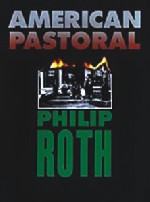Miss
America turns bomber.
Do
you still blame the parents?

Tim
Adams reviews American Pastoral by Philip Roth
Jonathan Cape, £15.99, pp432
Having
spent a good part of two decades scrutinising his imagination,
examining its origins and doubting, obsessively, its integrity,
Philip Roth, now in his mid sixties, seems determined simply
to employ his gift in all its extraordinary vigour. Hard at
the heels of Sabbath's Theater, and its remarkable whoring hero,
the great pretender has, with American Pastoral, produced his
second masterpiece within two years.
We open
in familiar Roth territory: Newark, New Jersey; and a half-lit
age of post-war hopefulness, a time when New York was still
a city of old-world craftsmen and new-world chancres, and 'atomic
energy was all our own'. The focus of all that optimism, all
that energy, at least in Newark's Weequahic High School, rests
in the frame of Seymour 'Swede' Levov: a blond-haired, blue-eyed
Jew, effortless star of every sport he plays.
Unlike many
of Roth's characters, raging for their slice of the American
pie, the Swede, with his Waspish looks and his corporeal brilliance,
is at liberty to gain access to the nation's dreams by conventional
means: through prowess on the ball park. Thus he inherits and
expands his father's glove-making business, marries the shiksa
Dawn Dwyer Miss New Jersey 1949, buys a smallholding upstate
and prepares for the simple successes to which he appears born.
But this being a Roth novel 'Simple is never that simple'. And
this being a Roth novel at least some of the complexity comes
from the rigmarole of unreliable narration.
The story
of Seymour Levov is told in the voice of Nathan Zuckerman, Roth's
long time alter ego. Zuckerman cherishes schoolboy memories
of the inscrutable Levov; when he runs into him in post-prostate
life there seem to be no cracks in the myth. It is only later,
when he meets the Swede's brother at a high-school reunion,
and he is informed how the Swede died in despair, that he begins
to imagine below the surface. Thus what we get is archetypal
blandness (Levov) viewed by exaggerated consciousness (Zuckerman);
a fantasy of threatened innocence as viewed by all-knowing experience.
And it would not be Philip Roth (or Nathan Zuckerman) if he
did not concoct mental traumas that were at least the equal
of his hero's physical magnificence.
The
author has long been preoccupied with the tyrannies our bodies
hold over us: for Portnoy it was the dictatorship of an over-eager
right hand; Zuckerman of The Anatomy Lesson was, like
Roth himself, a hostage to worn vertebrae; this time, however,
it is the very physical perfection of the Levovs that apparently
sets in motion the events that leads to the destruction of all
that they love.
For a while
though it is the American pastoral dream, the dream that is
encapsulated in the Swede, a real-life Johnny Appleseed, who
needs nothing more in his life than to 'stride' his own 100
acres, hand-in-hand with his own daughter, Merry, to their own
village store. At first the single tiny flaw in this world is
that the daughter suffers from a speech impediment, which, according
to her therapist, is an expression of her inadequacy beside
her all-too-idyllic parents. The personality disorder that creates
the stammer, however, becomes something far more alarming, and
that pastoral dream is comprehensively dismantled, cliché
by cliché, when, at the age of 16, Merry reduces the
village store to rubble with high explosives as part of an obscure
protest against the Vietnam war.
After the
bomb, which kills a family friend, all hell breaks loose for
the Swede. His daughter disappears and, in his mind, becomes
responsible for all of the Weathermen-inspired mayhem of the
late Sixties.
Roth has
long been a master of the rip-tide dynamics of mania; but here,
for the most part, he details the studied avoidance of conflict:
the strategies by which Levov continues to make sense of the
world. This, as a result, is a book that, wonderfully, tells
you more than you will ever want to know about glove-making.
Indeed there is an Updike-like preoccupation with surface and
process. But this is also Rabbit Angstrom as conceived by Philip
Roth, and eventually his comfort zone of kid leather and calfskin
is stripped away to reveal places of unimagined filth (this
reaches its apotheosis when, overcome by the stench of the unwashed
daughter he has come to rescue, Levov vomits in her face). As
the Swede's brother later yells, in a vintage two-page Rothian
rant: 'You wanted Miss America? Well, you've got her, with a
vengeance she's your daughter! The reality of this place is
right in your kisser now! America Amok! America Amuck!' Despite
its insistence on the more extreme degradations of modern America,
however, American Pastoral is no simple satire on the bucolic
delusions of the suburban middle class; far more of its anger
is in fact directed against the freedoms of the permissive society.
And on this
occasion, Roth's narrative tricksiness serves to hold our sympathies
for these attitudes in perfect uneasy balance. Few writers are
capable of raising themselves to the technical heights achieved
in the climactic scene here, a 100-page account of a dinner
party; hardly any are able with such authority to measure what
America has become against what it once seemed capable of. Only
this writer, however, would dare to do these things in the voice
of a sentimental old Jew, smooching with a high-school sweetheart
and reminiscing about his Boy's-Own hero. As a result this momentous
novel ends impossibly unresolved, ends in fact with the question
400 pages have been spent exploring: 'And what is wrong with
their life? What on earth is less reprehensible than the life
of the Levovs?' So wonders Philip Roth, all American. (For a
day).
This
review was first published in the British daily The Observer.

